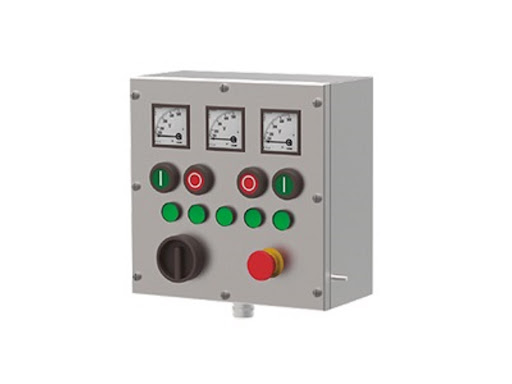LPBS / LCS
LPBS (Local Push Button Station) and LCS (Local Control Station) are vital components in industrial control systems, offering both basic and advanced control options for machinery and equipment in real-time. These control panels allow operators to directly interact with equipment at a local level, ensuring quick response, flexibility, and safety.
LPBS (Local Push Button Station)
An LPBS is a simple yet crucial control panel designed for straightforward operation. It typically includes essential push buttons such as Start, Stop, and Emergency Stop, making it easy for operators to manually control the machinery or motor.
Key Features of LPBS:
- User-Friendly: Basic functionality for easy control, such as start, stop, and emergency stop buttons.
- Safety: Emergency stop button to immediately cut off power and prevent accidents.
- Convenient Placement: Mounted near equipment for quick access.
- Manual Control: Provides operators with direct control without the need for automated systems.
- Compact and Durable: Built for industrial environments, ensuring robustness and reliability.
Applications of LPBS:
- Control of machinery in manufacturing plants.
- Used in conveyors, pumps, and fans.
- Emergency stop systems for critical equipment.
LCS (Local Control Station)
A Local Control Station (LCS) offers more advanced features compared to an LPBS. It not only includes start and stop buttons but also incorporates additional controls like selector switches, mode selection switches, and indicator lights. These features provide greater flexibility and functionality, allowing operators to switch between manual and automatic modes and view the operational status of equipment.
Key Features of LCS:
- Advanced Control: Includes selector switches for different operating modes (manual/automatic).
- Indicators: Provides visual feedback on the status of equipment (e.g., operational, fault, or maintenance).
- Flexibility: Ideal for environments that require more than just basic start/stop controls.
- Durable Construction: Built for tough industrial environments, ensuring longevity and performance.
Applications of LCS:
- Automated manufacturing systems where both manual and automatic controls are needed.
- Heavy machinery control, including pumps, compressors, and motors.
- Building management systems for HVAC, lighting, and other critical systems.
LPBS vs LCS: Key Differences
While both LPBS and LCS serve similar purposes of providing local control, the LCS offers more advanced control features, including the ability to manage different modes of operation, make adjustments on-site, and receive operational feedback. The LPBS, in contrast, provides basic manual control, often serving as a quick emergency stop or direct control for simple equipment operations.
In Summary:
- LPBS is ideal for simple, manual control in emergencies or basic operations.
- LCS is used when more control, flexibility, and operational feedback are required on the factory floor or industrial sites.
Both control stations enhance safety, operational efficiency, and the overall reliability of equipment in industrial settings. By incorporating these systems, industries can ensure smoother and safer machine operations, reducing downtime and enhancing productivity.

LPBS (Local Push Button Station) and LCS (Local Control Station) are essential control panels used in industrial settings for the safe and convenient operation of machinery or equipment at a local level.
LPBS (Local Push Button Station):
An LPBS is a simple, user-friendly control panel that typically includes basic push buttons such as start, stop, and emergency stop. These buttons allow operators to directly control the machinery or motor near the equipment itself. The start button initiates the operation, the stop button halts it, and the emergency stop is a safety feature that immediately cuts off power in case of an emergency. LPBS panels are often mounted close to the equipment, providing quick access and manual control. Their primary purpose is to offer a straightforward and efficient means to engage or disengage machinery without needing automated control.
LCS (Local Control Station):
An LCS is more sophisticated than an LPBS, offering additional control functionalities. Along with push buttons, an LCS may include selector switches to choose between different modes of operation (such as manual or automatic), indicators to display operational status, and other control features that give operators more flexibility in managing equipment. LCS panels are typically used when more than just basic start/stop functions are needed, such as adjusting operational modes or settings on-site.
Both LPBS and LCS are designed for harsh industrial environments, being robust and reliable, and they play a crucial role in ensuring the safety, flexibility, and efficiency of equipment operation on the factory floor or industrial sites.
